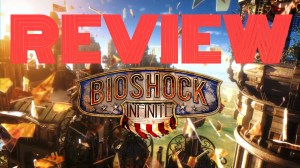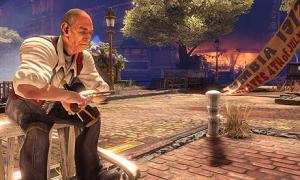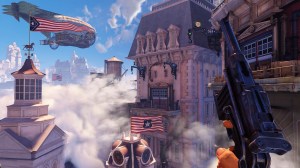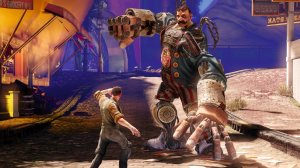This post has not been edited by the GamesBeat staff. Opinions by GamesBeat community writers do not necessarily reflect those of the staff.
You play as Booker Dewitt, a guy who owes some serious debt to some very, very unsavoury people. To pay back this debt he must enter the floating city in the sky called Columbia. The introduction is typical Bioshock, throwing you right in deep with the mysteries and giving you few explanations. If you watched all the trailers and kept up to date on it until its release, then you’ll generally know what the story is here.
When first entering Columbia, it is without doubt one of the most incredible experiences I have ever had in a video game. You don’t enter the actual city straight away; instead you enter through a church like place full of statues and art, flowers and candles and ankle deep water that covers the floor. It is stunningly beautiful, yet eerie and somewhat wrong. The music that plays is gorgeous and sets the scene almost too well as I spent ages just wandering around this one section.
Once you enter the city itself, well, it is breathtaking. It. Is. Phenomenal. I could, but I won’t and don’t want to, spend half the review expressing how incredible Columbia is, so let me sum it up here:
The art design, the people, the setting, the world itself and every way it has been developed is so perfectly realised, so brilliantly vibrant, lively and just outright alive, that your jaw may very well hit he ground. It is just amazing. Truly, truly, wonderful.
Every part of Columbia is built to fit the scene, to fit what you are doing and it just works incredibly well. It is without doubt one of the most intriguing, beautiful and spectacular game worlds ever created.
As you, Booker, go through the world, wandering around exploring, admiring the scenery, even partaking in funfair events, all on the way to find Elizabeth, the girl who Booker was sent here to rescue, you realise that the world you have entered into practically exists in real life. Few game settings are as realised as this one.
However things soon turn sour. After an event that occurs out of the blue, Booker suddenly becomes the bad guy to all of Columbia, having to fight his way to Elizabeth and then trying to escape Columbia.
The entire story remains fairly basic for a lot of the game. You simply must find Elizabeth, survive and escape.
Towards the end, however, things really spice up. There isn’t really one massive twist here; there are a lot of twists and turns that make you question absolutely everything. You won’t expect or know what they are, but they’re coming. Nothing more can be said. There is no way I am even going to remotely risk spoiling anything about the story for anyone. The plot is just phenomenal. It is the best story I have ever experienced in a video game.
What really makes all these twists and all these events really matter and really affect you is your attachment to the characters. Unlike with the original Bioshock, the setting is simply the setting. It is incredible, but everything else in Infinite is too and it is in no way the focus. The characters and story itself is really what make the game work.
Booker Dewitt is the deepest; most richly, well crafted and emotionally furnished first-person character I’ve ever played as. He speaks, a lot. He speaks his mind, he comments on events, he gives advice to you discreetly in his own thoughts and speech, and he has conversations. He is a deep, likeable but also far from perfect character. He is an outstanding person to play as and the feelings you develop for him are natural and never forced.
Elizabeth, however, is the best of them all. She is the first AI ‘sidekick’ character that isn’t A) Annoying or B) Useless. Not only is she extremely likeable, deep and very absorbing, but she actually does things. You don’t have to spend your time in combat trying to protect her as she doesn’t take damage and she will grab your attention during both combat and exploration by simply calling out ‘Booker’ and then throwing you some ammo, salts, weapons or money by the player pressing X/Square to accept them. She can also use her ‘tearing’ ability to bring in health packs, weapons, ammo, cover and more.
She also proves to be awesome conversation. There are no proper cutscenes here and even when things do become scripted, it’s not done by changing scenes or anything or becoming heavily animated. If Booker and Elizabeth have a conversation while walking along, it is just done while walking along, casually, like you would in real life.
She always comments on this and that and also points out interesting items for you to pick up. She can also pick locks, which is an extremely vital part of the game.
During the game she may become distracted, she may need comforting, she may need help, she may want to dance; what I’m saying is she is a real person that has her own, very accessible, personality and thoughts. She is herself. Not generic or cliche, just herself. She adds humour, conversation, help and emotion to the story.
Other side characters often feel fairly shallow however, due to how deep and incredible the two leads are. There is a character called Slate who I didn’t really feel anything for when I felt like I should be feeling something for him. But I just didn’t. They are still good characters, however when you have two characters like Booker and Elizabeth who are as involving and deep as they are, it is hard to feel much for seemingly shallow side characters.
I could spend forever discussing the people in the game just like I could Columbia itself, however that would be stupid.
Combat on the other hand was a part of the first Bioshock that lacked. When I reviewed it for my old website, the weak gunplay held it back to a score of 9.6. Infinite doesn’t have this problem, thankfully.
The gameplay involves three things: gunplay, vigors and the skyline. I will also be covering level design as well, but in a little bit.
The thing that is so awesome about the gunplay is the fact that is retains the Bioshock feel, but tightens it up and makes it feel far more focused and less, well, sloppy feeling.
It still feels a bit heavy and weapons can be a little hard to handle, but that isn’t bad, that is just the style of Bioshock’s gameplay. There are a lot of weapons to choose from to use, however you can only carry two at once. It is fantastic how Infinite kept the typical Bioshock-styled gunplay while improving it. It still has its own identity and doesn’t feel anything like other FPS games.
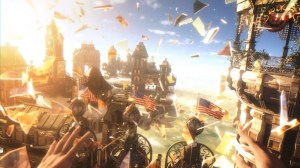 Vigors, on the other hand, are Infinite’s version of Bioshock’s plasmids and offer a different way to deal with enemies than guns. There are a total of eight vigors to use, which you discover and use throughout the game. These all do different things and they can all be carried at once. I changed my button layout to Marksman to allow for easier gun aiming and vigor use. In this layout you have to hold LB/L1 to access all the vigors and choose which to equip. Unfortunately, and this isn’t an issue on the PC, this way of using vigors is a bit cumbersome. Despite the fact that while the vigor menu is up the game pauses, it takes you out of the experience. What’s more; because the combat is so fast paced you often forget about them and don’t have time to switch vigors or even use them.
Vigors, on the other hand, are Infinite’s version of Bioshock’s plasmids and offer a different way to deal with enemies than guns. There are a total of eight vigors to use, which you discover and use throughout the game. These all do different things and they can all be carried at once. I changed my button layout to Marksman to allow for easier gun aiming and vigor use. In this layout you have to hold LB/L1 to access all the vigors and choose which to equip. Unfortunately, and this isn’t an issue on the PC, this way of using vigors is a bit cumbersome. Despite the fact that while the vigor menu is up the game pauses, it takes you out of the experience. What’s more; because the combat is so fast paced you often forget about them and don’t have time to switch vigors or even use them.
In truth the vigors aren’t anywhere near as useful as the plasmids from Bisohock, mainly because the guns in Infinite do more than enough to take out enemies, whereas in Bioshock weapons were not as reliable.
If vigors had done a bit more, maybe been more powerful, they would have been more useful.
The skyline part of the game allows you to swing and ride along and around the environment. Sometimes this is to get from A to B, however you can also use the skylines in combat. Jumping onto a skyline and riding along for a bit is a good way to move around the area and get to high up enemies quickly, as well as regenerate health faster while avoiding damage. Unfortunately, for some reason getting onto the skylines is actually inconsistent. You can’t simply jump towards one and automatically hook onto it; you must first make sure you have highlighted the skyline and then press A/X. This makes getting onto them quickly difficult and distracting and I didn’t use them much because of it.
Combat itself is good fun. It gets very hard later on (especially on the higher difficulties) and you never feel like you have excessive, over the top, power. At the end, you still feel vulnerable and human, unlike in the first game when you felt like a total beast.
Other parts of the gameplay are made up of titbits, like purchasing more ammo from vending machines as well as vigor and weapon upgrades. These work well, although the Bioshock 1 upgrade system is far deeper and more interesting. I actually upgraded few weapons and vigors, especially because I often ran out of ammo and had to change guns during combat, so I never had a set loadout I carried with me and could not appropriately upgrade the weapons I wanted.
Looting dead bodies, trashcans and loads of other things like tills and crates, allow you to find more ammo and supplies that way. You can also simply find these lying around the environment. You may also find codes and some special, locked, crates that, when cracked/opened (often requiring the use of Elizabeth), present you with a lot of special supplies. These are referred to as ‘Optional side quests’, which is a bit of an exaggeration as they aren’t exactly ‘side quests’. That said, it does require a lot of time and patience to find the key or code cracker.
Navigating your way to objectives is extremely well implemented. Instead of a big arrow at the top of the screen like in the old Bioshock’s, you have a Dead Space styled arrow line thing that points you in the right direction when activated. Press the up key on the D-pad and an arrow zips along the ground, showing you where to go. It isn’t big and brash and it works well in both helping you get to where you want as well as keeping you immersed.
The level design in Infinite is about as good as the art design, so it is basically perfect. Environments are big and expansive, they look amazing and there are often well placed skylines to help battles be even more fast paced. You never feel bored in a fight scene and it all flows together brilliantly. What’s more, pacing is near perfect. Sure, sometimes a quiet time would have been better than aonther battle, but it isn’t a big deal all the time.
Bioshock Infinite is without doubt the best game I have played this year, and it will take one hell of a title to change that. In fact, I think it is possibly even the best game of the generation. It does what Bioshock 1 did, but better and more efficiently with more content of a higher quality. And if I gave that game a 9.6/10, there is only one score I can give Infinite. Yep, for the first time ever as a reviewer of games, I am giving out a 10/10 score. Infinite isn’t perfect. No game is. But it is as close to perfection I’ve ever seen a game be. The niggles are so tiny I’ve forgotten them already. This game is phenomenal, with the best ending and story and characters to a game I have ever seen. Ever. Out of all games I have played.
When you finish it all you want to do is go back and do it all again. And you will. And it will still be amazing.
